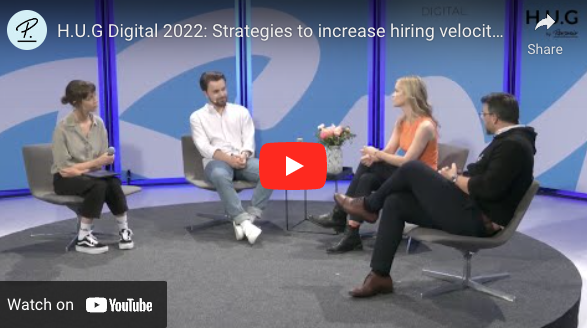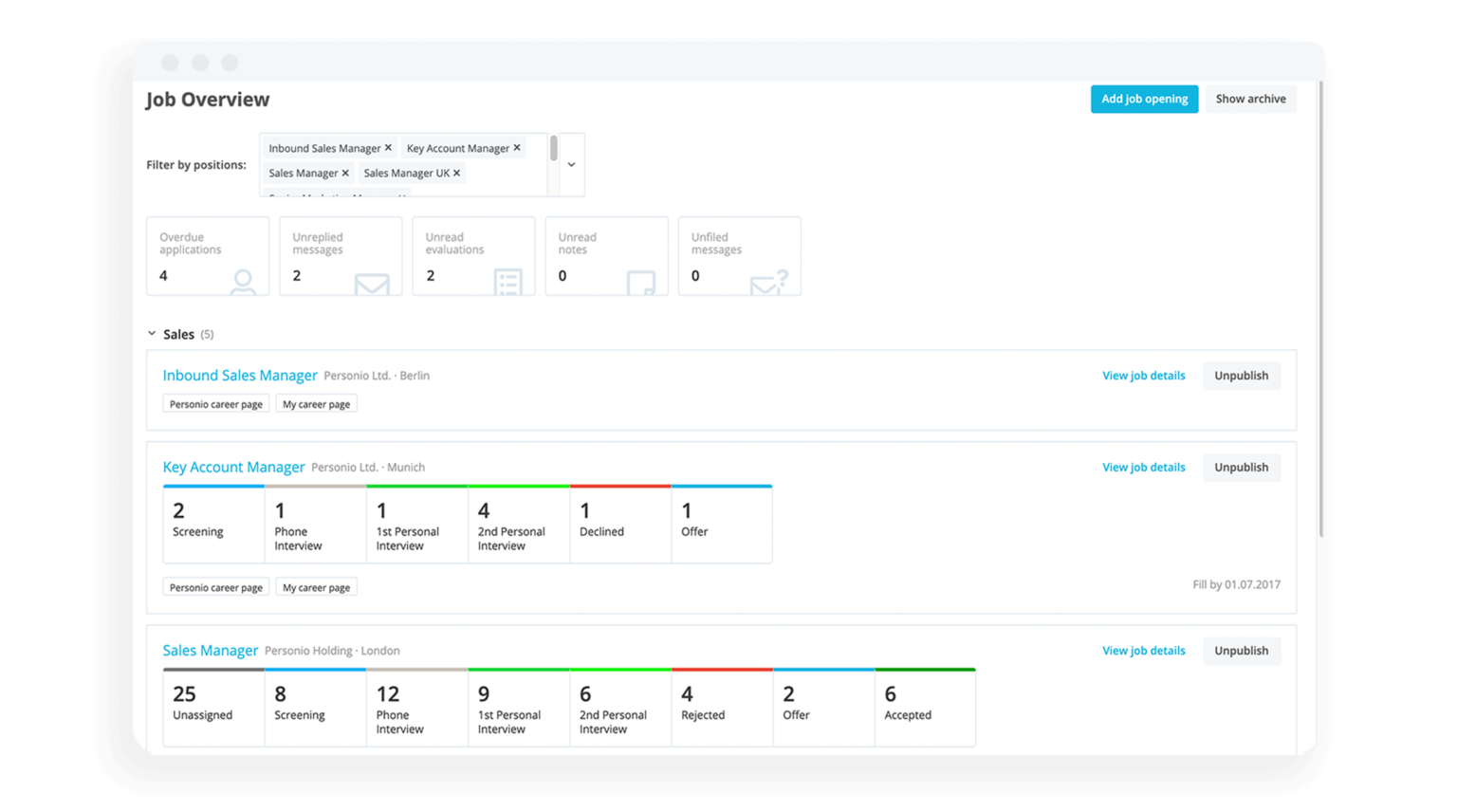Giving Great Interview Feedback: Examples You Can Use Right Now

In this article, we talk about interview feedback examples is and why it’s important. In addition, we also provide tips on how to give great feedback, as well as sharing a few things you shouldn’t do when telling candidates why they didn’t get the job.
One centralised solution for all your interview feedback: Personio.
What is Interview Feedback?
Interview feedback is a type of feedback offered to a candidate after they finish interviewing with your company. Giving productive interview feedback can be good for your employer brand and general company reputation.
More often than not, interview feedback is given when a candidate did not the job. After all, you likely don’t need to give feedback when you are giving a job offer, instead.
That said, interview feedback is often not provided due to it being a time-consuming and difficult task. But, if done right, feedback can be extremely helpful for candidates who can learn from it and improve their chances of succeeding in future job interviews.
It’s also good for candidate experience. And it might even help you employ people more efficiently in the future: whether your first choice turns down the job offer, or if the candidate decides to apply for another role with your company in future.
More often than not, candidates actually want interview feedback. Research by Debut indicated that 77% of over 70,000 18-23-year-olds agreed that feedback should be a legal requirement, and four in five candidates claimed to never have received feedback after interviews.
The Pivotal Role of Interview Feedback
This quote by Mary Jackson, writing in HR Magazine, sums it up: “Feedback is powerful. Anyone who takes the time to attend an interview is entitled to it.” This is why feedback is so important for your hiring process and reputation, overall.
Imagine if your preferred candidate doesn’t accept the job offer. If you haven’t given helpful and constructive feedback to the other candidates who were a near miss (your second or third choice), you might lose the chance to employ them, too!
One Place for All Your Interview Feedback

Hire at scale with easily documented and trackable interview feedback. Learn more now.
Hiring At Scale With Personio
13 Interview Feedback Best Practices
Make sure to keep some of these critical interview tips in mind:
Don’t delay! Type up feedback straight after the interview.
Plan any feedback you’ll be giving. Be honest, but kind.
Keep it professional and related to the role.
Set realistic expectations from the moment you call.
Try to avoid being confrontational.
Be helpful. Make your feedback actionable and be concise.
Don’t be vague. Share specific examples.
Make suggestions about what they could do differently in future.
Offer feedback on any or all parts of the hiring process – not just the interviews.
Give positive feedback and praise to build their confidence..
Give feedback on a wide variety of things.
Be consistent. A structured interview process helps with consistency.
Provide structure. Basing things on a framework makes it easier to give accurate, consistent feedback to all candidates.
Don’t forget that you can get candidate feedback, too! This can help improve your whole recruitment process – if you’re up for it.
H.U.G 2022: Strategies to Increase Hiring Velocity and Candidate Retention

We need your consent to load this service!
This content is not permitted to load due to trackers that are not disclosed to the visitor.
How Do You Write Feedback for an Interview?
The following structure should serve as a strong interview feedback example when you’re offering feedback to a candidate:
First, provide an answer. (Are you hiring them? Yes or no?)
Explain their strengths. (E.g. The candidate demonstrated excellent communication skills. They were courteous and respectful. They showed good knowledge of our industry. They shared our passion for [insert relevant detail].)
Explain why they weren’t a good fit for the company or talk about areas where they can improve. (E.g. They weren’t able to show us they had the required level of experience. Their CV led us to believe they had led a large team but during the interview, we discovered that they had only led a team of two people. They appeared to lack these skills which are part of the job requirement).
Summarise the experience and next steps. (E.g. We will be delighted to employ Max and will be in touch to ask for references shortly. Or the alternative… While we enjoyed meeting Jo, we felt that they do not have the required level of skill at this stage. We welcome applications from them in a few years’ time).
Regardless of whether a candidate did or didn’t get the job, it’s worth following the same process. Not only does this improve consistency, but it also reduces your risk of any exposure from a candidate who is negative about not getting the job, and is an important part of the recruiting process.
Example of Interview Feedback You Can Use
If you’re not really sure how to provide job interview feedback to candidates, here are a few examples that might be helpful.
If you don’t think the candidate has the right experience: | “We have decided not to move forward with you as you lack experience with [insert detail here], which is essential for the role”. |
If you think they’re over-qualified for the role: | “With your extensive expertise in this area we are concerned that you might not stay motivated in this role for long.” |
If you are concerned that their skills don’t match up with their CV: | “During the interview process the candidate wasn’t able to demonstrate familiarity or comfort with the following skills [insert detail here].” |
If there’s something they could do better for a future interview: | “For future roles, it might be worth checking out [insert missing information] so you can speak more confidently about this.” |
If you believe they’re a great fit for your company: | “We appreciate your ability to show how your personal values match our company ones. We think you would be a great fit for the company.” |
If you think they’ve done great homework about you: | “We loved how much preparation you did for this interview. Thank you for the time and effort you put in.” |
Create a great candidate experience

Organise applications, plan interviews and quickly evaluate candidates. Manage your entire hiring process with one tool with Personio.
Unlock Smoother HiringWhat Is Positive Interview Feedback?
Positive interview feedback involves highlighting all the elements that the candidate handled well during the interview. For example, you might like to give feedback and examples of how they showcased their technical skills, communication skills and project management skills.
Remember, never compare them to other candidates and if you can, share some tips for their next steps, whether it's with your company or their career lies elsewhere. You can also ask them for feedback from their experience of the interview process.
What Are Some Examples of Negative Feedback After an Interview?
A lot of candidates you meet may not be the right fit and you need to be able to deliver clear, constructive feedback in a meaningful way to them. Communicate this over a phone call rather than email and be specific with both your compliments and your critiques.
For example, if their experience isn't a match, pinpoint the exact addressable skills that they can work on with online courses. If you see their value, suggest staying in touch – connect on LinkedIn and see if they may be suitable for a different role down the line.
What Not to Do When Giving Feedback
Candidates who didn’t get the job will probably be disappointed. Here are a few tips about what you shouldn’t do, so you can make sure your feedback is both valuable and constructive:
Don’t give them feedback if they don’t want it. Check with them to see if they’d find it valuable before you send it.
Don’t make it personal. It’s natural to hire people we like but if you just don’t like them, don’t tell them. It’s not helpful and it won’t leave a good impression.
Don’t be rude or condescending. Make sure the tone of your response is neutral.
Don’t give them false hope. If you have no intention of considering them for a role in future, don’t tell them that or say you’ll keep their CV on file.
Don’t provide too much information or be careless with your response. If in doubt, consult a legal representative to make sure you’re not opening yourself up to any future come-back from an un-hired candidate.
Document Interview Feedback the Easy Way
Admittedly, it’s time-consuming and can be painful to conduct multiple interviews – never mind giving detailed interview feedback. If you’re ready to automate your recruitment process, take a look at what Personio’s Applicant Tracking Software (ATS) offers today.
